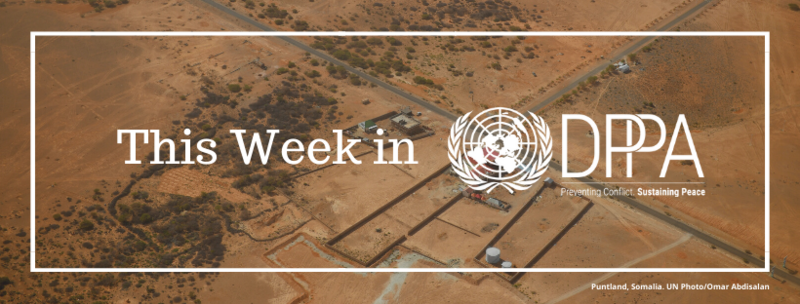
The UN chief António Guterres on Wednesday said he continues to be “very concerned” about armed clashes and the threat to civilian life across the Central African Republic, where around 200,000 have been displaced by fighting in under two months.
The UN Special Envoy on Myanmar appealed on Tuesday for the Security Council to unite in support of democracy in the country in the wake of the recent power grab by the military and the declaration of a one-year state of emergency.
On 10 January, the former United States Secretary of State, Michael Pompeo, announced the designation of the Houthis (Ansar Allah) as a foreign terrorist organization and a specially designated global terrorist entity. The designation entered into effect on 19 January.
The UN High Commissioner for Human Rights has voiced “deep fears” of a violent crackdown on dissenting voices in Myanmar, where the military assumed all powers and declared a state of emergency after overthrowing the civilian government and arresting top political leaders, on Monday.
Recent intercommunal violence and deadly attacks in Darfur have prompted two independent UN human rights experts on Monday to urge the Government of Sudan to urgently implement strong measures to ensure the safety of civilians, including the internally displaced.
All Libyans have a chance at national reconciliation and renewal once the country’s representatives, who have begun meeting in Switzerland, vote on a new executive, UN negotiator Stephanie Williams said on Monday.
The United Nations envoy for Somalia has strongly condemned Sunday’s terrorist attack on a hotel near the international airport in capital Mogadishu that left at least five people dead and dozens more wounded.
The United Nations Secretary-General has strongly condemned the detention of Myanmar’s top political leaders and government officials, including State Counsellor Aung San Suu Kyi and President Win Myint, by the country’s military.
Several people, including four children, are reported dead, with many more injured, following a weekend of deadly bomb attacks in towns in northern rural Aleppo, Syria.
Geir Pedersen, UN Special Envoy for Syria, lamented the slow progress of the peace process in the country, in remarks to the press on Friday, following a meeting involving members of the UN-facilitated Syrian Constitution Committee, in Geneva.
Violence and insecurity related to the recent elections in the Central African Republic (CAR) has forced more than 200,000 people to flee their homes in less than two months, the UN refugee agency (UNHCR) said on Friday, warning tens of thousands are facing dire living conditions.
This Week in DPPA is a brief roundup of political and peacebuilding events and developments at UNHQ and around the world.
Security CouncilDiCarlo: “Recovering better” from COVID-19 also requires more political and financial investment to strengthen conflict prevention
Ceasefire in Libya continues to be observed Acting Special Representative Stephanie Williams on 28 January briefed on the recent progress in the peace process in Libya. She was pleased to report that the ceasefire signed in Geneva on 23 October continues to be observed. “Libyans are keen to turn the page, to reclaim Libyan sovereignty and ownership of their destiny as a people after many years of relentless armed conflict, societal fragmentation, and crippling institutional division. This rejuvenation of Libyan patriotism must be sustained, harnessed, and supported by this Council to open a new path for Libya towards democracy, respect for human rights, accountability and justice under the rule of law,” Ms. Williams said. Read her full statement here Read more in UN News
AfghanistanGlobal Open Days discussions emphasize inclusion of women’s voices in peace talks
IraqNew report on the right to education
YemenFifth meeting of the Supervisory Committee on Prisoners and Detainees
SomaliaVisits to Federal Member States |
|
“It is important to acknowledge the progress that has been made”
West AfricaInclusiveness crucial to prevent conflicts
ColombiaEducational talks on restorative justice for former combatants
|
Subscribe to This Week in DPPA by clicking here: Sign Up Now
Contact DPPA at dppa@un.org
United Nations Secretary-General António Guterres has called for restrain in Myanmar, amid reports of rising tensions over the outcome of last year’s general elections.
The top UN official in Libya urged the Security Council on Thursday to express clear support for a new unified government in Libya, amid hopeful signs that a decade of armed conflict might finally be coming to an end.
Civilians in Yemen’s Hudaydah Governorate, face a growing threat from escalating clashes, with shelling of residential areas ongoing, endangering thousands.
The handover of a former Central African Republic (CAR) militia leader and war crimes suspect to the International Criminal Court (ICC) has sent a strong warning to rebel groups, political actors and others who thrive on impunity, a UN independent human rights expert said on Wednesday.
New York, 27 January 2021
Today we honour the memory of the six million Jews and millions of others who were systematically murdered in the Holocaust by the Nazis and their collaborators.
This year’s anniversary takes place under the shadow of the COVID-19 pandemic, which has revealed longstanding fractures and injustices in our societies and contributed to a resurgence in antisemitism and...
Against the backdrop of a COVID-19 crisis that has exacerbated pre-pandemic challenges and a global ceasefire appeal to combat it, the UN chief called for new peacebuilding funds on Tuesday, promising a “renewed approach to multilateralism and international cooperation”.
Palestinian elections scheduled for later this year will be a crucial step towards unity, the new UN envoy in the region, Tor Wennesland, said on Tuesday in his first briefing to the Security Council.